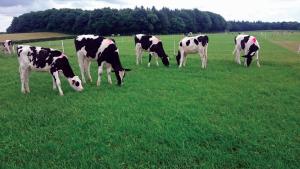Over the past number of weeks, AFBI has been diagnosing an increasing number of lungworm infections in cattle.

Lungworm is a parasitic infection of the respiratory tract in cattle, which can cause severe disease outbreaks with coughing and respiratory distress. Death can occur in heavy infestations. Other signs can include weight loss, and reduced milk yield in dairy cows.
Disease due to lungworm (also known as parasitic bronchitis, ‘hoose’ or ‘husk’) is most commonly seen in young cattle during their first grazing season, usually in the late summer and early autumn, and dairy calves and autumn-born suckled calves are most at risk. Outbreaks, however can be unpredictable, and disease is being increasingly seen earlier in the year, and in older cattle.
Animals that are exposed to lungworms usually develop immunity to re-infection. However, a lack of exposure in young cattle can result in clinical disease in older cattle. In order to maintain immunity, further exposure to lungworm is important. Disease in older animals is being increasingly diagnosed in AFBI both in those that have not previously been exposed, or in those whose immunity has diminished due to not having been re-exposed.
Cattle are infected through eating grass which is contaminated with infective larvae passed out in the dung of other infected animals. Mild, damp conditions favour the survival of these larvae on the pasture. The present warm conditions with rainfall favour this situation and so vigilance is advised.
Diagnosis is often based on the clinical picture of coughing and respiratory signs in batches of calves, or older cattle, grazing permanent or semi-permanent pasture particularly in late summer or early autumn. Diagnosis can be aided by the detection of larvae in faecal samples, however severe disease can occur prior to larvae being present in faeces.
Anthelmintic and vaccination options are available for the treatment or control of lungworm disease, however veterinary advice should be sought prior to treatment as symptoms may be made worse in severely affected animals by dead or dying larvae which can block the lower airways.
Latest news
- Resilience, Sustainability and Innovation survey 03 March 2025
- AFBI led Project Launched to Promote Sustainable Dairy Farming across the UK 18 February 2025
- UK Project Launched to Promote Sustainable Dairy Farming 11 February 2025
- International Day of Women and Girls in Science 11 February 2025
